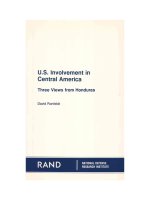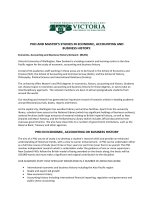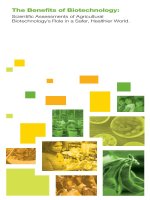Alice’s Adventures in WonderlandBy Lewis Caroll (1865)Download free eBooks of classic literature, books and novels at Planet eBook. Subscribe to our free eBooks blog and email newsletter..All in the Golden AfternoonAll in the golden afternoon Full ppt
Bạn đang xem bản rút gọn của tài liệu. Xem và tải ngay bản đầy đủ của tài liệu tại đây (1.73 MB, 111 trang )
Download free eBooks of classic literature, books and
novels at Planet eBook. Subscribe to our free eBooks blog
and email newsletter.
Alice’s Adventures
in Wonderland
By Lewis Caroll (1865)
A’ A W
All in the Golden Aernoon
All in the golden aernoon
Full leisurely we glide;
For both our oars, with little skill,
By little arms are plied,
While little hands make vain pretense
Our wanderings to guide.
Ah, cruel ree! In such an hour,
Beneath such dreamy weather,
To beg a tale of breath too weak
To stir the tiniest feather!
Yet what can one poor voice avail
Against three tongues together?
Imperious Prima ashes forth
Her edict to “begin it”:
In gentler tones Secunda hopes
“ere will be nonsense in it.”
While Tertia interrupts the tale
Not more than once a minute.
F B P B.
Anon, to sudden silence won,
In fancy they pursue
e dream-child moving through a land
Of wonders wild and new,
In friendly chat with bird or beast—
And half believe it true.
And ever, as the story drained
e wells of fancy dry,
And faintly strove that weary one
To put the subject by,
“e rest next time—” “It is next time!”
e happy voices cry.
us grew the tale of Wonderland:
us slowly, one by one,
Its quaint events were hammered out—
And now the tale is done,
And home we steer, a merry crew,
Beneath the setting sun.
Alice! a childish story take,
And with a gentle hand
Lay it where Childhood’s dreams are twined
In Memory’s mystic band,
Like pilgrim’s withered wreath of owers
Plucked in a far-o land.
A’ A W
Chapter I.
Down the Rabbit-Hole
A
lice was beginning to get very tired of sitting by her
sister on the bank, and of having nothing to do: once
or twice she had peeped into the book her sister was read-
ing, but it had no pictures or conversations in it, ‘and what
is the use of a book,’ thought Alice ‘without pictures or con-
versation?’
So she was considering in her own mind (as well as she
could, for the hot day made her feel very sleepy and stu-
pid), whether the pleasure of making a daisy-chain would
be worth the trouble of getting up and picking the daisies,
when suddenly a White Rabbit with pink eyes ran close by
her.
ere was nothing so very remarkable in that; nor did
Alice think it so very much out of the way to hear the Rab-
bit say to itself, ‘Oh dear! Oh dear! I shall be late!’ (when
she thought it over aerwards, it occurred to her that she
ought to have wondered at this, but at the time it all seemed
quite natural); but when the Rabbit actually took a watch
out of its waistcoat-pocket, and looked at it, and then hur-
ried on, Alice started to her feet, for it ashed across her
mind that she had never before seen a rabbit with either a
waistcoat-pocket, or a watch to take out of it, and burning
with curiosity, she ran across the eld aer it, and fortu-
F B P B.
nately was just in time to see it pop down a large rabbit-hole
under the hedge.
In another moment down went Alice aer it, never once
considering how in the world she was to get out again.
e rabbit-hole went straight on like a tunnel for some
way, and then dipped suddenly down, so suddenly that Al-
ice had not a moment to think about stopping herself before
she found herself falling down a very deep well.
Either the well was very deep, or she fell very slowly, for
she had plenty of time as she went down to look about her
and to wonder what was going to happen next. First, she
tried to look down and make out what she was coming to,
but it was too dark to see anything; then she looked at the
sides of the well, and noticed that they were lled with cup-
boards and book-shelves; here and there she saw maps and
pictures hung upon pegs. She took down a jar from one of
the shelves as she passed; it was labelled ‘ORANGE MAR-
MALADE’, but to her great disappointment it was empty:
she did not like to drop the jar for fear of killing somebody,
so managed to put it into one of the cupboards as she fell
past it.
‘Well!’ thought Alice to herself, ‘aer such a fall as this,
I shall think nothing of tumbling down stairs! How brave
they’ll all think me at home! Why, I wouldn’t say anything
about it, even if I fell o the top of the house!’ (Which was
very likely true.)
Down, down, down. Would the fall never come to an
end! ‘I wonder how many miles I’ve fallen by this time?’
she said aloud. ‘I must be getting somewhere near the cen-
A’ A W
tre of the earth. Let me see: that would be four thousand
miles down, I think—’ (for, you see, Alice had learnt sev-
eral things of this sort in her lessons in the schoolroom, and
though this was not a VERY good opportunity for showing
o her knowledge, as there was no one to listen to her, still it
was good practice to say it over) ‘—yes, that’s about the right
distance—but then I wonder what Latitude or Longitude
I’ve got to?’ (Alice had no idea what Latitude was, or Longi-
tude either, but thought they were nice grand words to say.)
Presently she began again. ‘I wonder if I shall fall right
through the earth! How funny it’ll seem to come out among
the people that walk with their heads downward! e An-
tipathies, I think—’ (she was rather glad there WAS no one
listening, this time, as it didn’t sound at all the right word)
‘—but I shall have to ask them what the name of the country
is, you know. Please, Ma’am, is this New Zealand or Austra-
lia?’ (and she tried to curtsey as she spoke—fancy curtseying
as you’re falling through the air! Do you think you could
manage it?) ‘And what an ignorant little girl she’ll think me
for asking! No, it’ll never do to ask: perhaps I shall see it
written up somewhere.’
Down, down, down. ere was nothing else to do, so Al-
ice soon began talking again. ‘Dinah’ll miss me very much
to-night, I should think!’ (Dinah was the cat.) ‘I hope they’ll
remember her saucer of milk at tea-time. Dinah my dear!
I wish you were down here with me! ere are no mice in
the air, I’m afraid, but you might catch a bat, and that’s very
like a mouse, you know. But do cats eat bats, I wonder?’ And
here Alice began to get rather sleepy, and went on saying to
F B P B.
herself, in a dreamy sort of way, ‘Do cats eat bats? Do cats
eat bats?’ and sometimes, ‘Do bats eat cats?’ for, you see, as
she couldn’t answer either question, it didn’t much matter
which way she put it. She felt that she was dozing o, and
had just begun to dream that she was walking hand in hand
with Dinah, and saying to her very earnestly, ‘Now, Dinah,
tell me the truth: did you ever eat a bat?’ when suddenly,
thump! thump! down she came upon a heap of sticks and
dry leaves, and the fall was over.
Alice was not a bit hurt, and she jumped up on to her
feet in a moment: she looked up, but it was all dark over-
head; before her was another long passage, and the White
Rabbit was still in sight, hurrying down it. ere was not a
moment to be lost: away went Alice like the wind, and was
just in time to hear it say, as it turned a corner, ‘Oh my ears
and whiskers, how late it’s getting!’ She was close behind it
when she turned the corner, but the Rabbit was no longer to
be seen: she found herself in a long, low hall, which was lit
up by a row of lamps hanging from the roof.
ere were doors all round the hall, but they were all
locked; and when Alice had been all the way down one side
and up the other, trying every door, she walked sadly down
the middle, wondering how she was ever to get out again.
Suddenly she came upon a little three-legged table, all
made of solid glass; there was nothing on it except a tiny
golden key, and Alice’s rst thought was that it might be-
long to one of the doors of the hall; but, alas! either the locks
were too large, or the key was too small, but at any rate it
would not open any of them. However, on the second time
A’ A W
round, she came upon a low curtain she had not noticed
before, and behind it was a little door about een inches
high: she tried the little golden key in the lock, and to her
great delight it tted!
Alice opened the door and found that it led into a small
passage, not much larger than a rat-hole: she knelt down and
looked along the passage into the loveliest garden you ever
saw. How she longed to get out of that dark hall, and wan-
der about among those beds of bright owers and those cool
fountains, but she could not even get her head though the
doorway; ‘and even if my head would go through,’ thought
poor Alice, ‘it would be of very little use without my shoul-
ders. Oh, how I wish I could shut up like a telescope! I think
I could, if I only know how to begin.’ For, you see, so many
out-of-the-way things had happened lately, that Alice had
begun to think that very few things indeed were really im-
possible.
ere seemed to be no use in waiting by the little door,
so she went back to the table, half hoping she might nd
another key on it, or at any rate a book of rules for shut-
ting people up like telescopes: this time she found a little
bottle on it, (’which certainly was not here before,’ said Al-
ice,) and round the neck of the bottle was a paper label, with
the words ‘DRINK ME’ beautifully printed on it in large
letters.
It was all very well to say ‘Drink me,’ but the wise little
Alice was not going to do that in a hurry. ‘No, I’ll look rst,’
she said, ‘and see whether it’s marked ‘poison’ or not’; for she
had read several nice little histories about children who had
F B P B.
got burnt, and eaten up by wild beasts and other unpleas-
ant things, all because they would not remember the simple
rules their friends had taught them: such as, that a red-hot
poker will burn you if you hold it too long; and that if you
cut your nger very deeply with a knife, it usually bleeds;
and she had never forgotten that, if you drink much from a
bottle marked ‘poison,’ it is almost certain to disagree with
you, sooner or later.
However, this bottle was not marked ‘poison,’ so Alice
ventured to taste it, and nding it very nice, (it had, in fact,
a sort of mixed avour of cherry-tart, custard, pine-apple,
roast turkey, toee, and hot buttered toast,) she very soon
nished it o.
*****
‘What a curious feeling!’ said Alice; ‘I must be shutting
up like a telescope.’
And so it was indeed: she was now only ten inches high,
and her face brightened up at the thought that she was now
the right size for going through the little door into that love-
ly garden. First, however, she waited for a few minutes to see
if she was going to shrink any further: she felt a little ner-
vous about this; ‘for it might end, you know,’ said Alice to
herself, ‘in my going out altogether, like a candle. I wonder
what I should be like then?’ And she tried to fancy what the
ame of a candle is like aer the candle is blown out, for she
could not remember ever having seen such a thing.
Aer a while, nding that nothing more happened, she
decided on going into the garden at once; but, alas for poor
Alice! when she got to the door, she found she had forgotten
A’ A W
the little golden key, and when she went back to the table for
it, she found she could not possibly reach it: she could see
it quite plainly through the glass, and she tried her best to
climb up one of the legs of the table, but it was too slippery;
and when she had tired herself out with trying, the poor
little thing sat down and cried.
‘Come, there’s no use in crying like that!’ said Alice to
herself, rather sharply; ‘I advise you to leave o this minute!’
She generally gave herself very good advice, (though she
very seldom followed it), and sometimes she scolded her-
self so severely as to bring tears into her eyes; and once she
remembered trying to box her own ears for having cheated
herself in a game of croquet she was playing against herself,
for this curious child was very fond of pretending to be two
people. ‘But it’s no use now,’ thought poor Alice, ‘to pretend
to be two people! Why, there’s hardly enough of me le to
make ONE respectable person!’
Soon her eye fell on a little glass box that was lying under
the table: she opened it, and found in it a very small cake, on
which the words ‘EAT ME’ were beautifully marked in cur-
rants. ‘Well, I’ll eat it,’ said Alice, ‘and if it makes me grow
larger, I can reach the key; and if it makes me grow smaller, I
can creep under the door; so either way I’ll get into the gar-
den, and I don’t care which happens!’
She ate a little bit, and said anxiously to herself, ‘Which
way? Which way?’, holding her hand on the top of her head
to feel which way it was growing, and she was quite sur-
prised to nd that she remained the same size: to be sure,
this generally happens when one eats cake, but Alice had got
F B P B.
so much into the way of expecting nothing but out-of-the-
way things to happen, that it seemed quite dull and stupid
for life to go on in the common way.
So she set to work, and very soon nished o the cake.
*****
A’ A W
Chapter II.
The Pool of Tears
‘C
uriouser and curiouser!’ cried Alice (she was so much
surprised, that for the moment she quite forgot how
to speak good English); ‘now I’m opening out like the larg-
est telescope that ever was! Good-bye, feet!’ (for when she
looked down at her feet, they seemed to be almost out of
sight, they were getting so far o). ‘Oh, my poor little feet,
I wonder who will put on your shoes and stockings for you
now, dears? I’m sure I shan’t be able! I shall be a great deal
too far o to trouble myself about you: you must manage
the best way you can; —but I must be kind to them,’ thought
Alice, ‘or perhaps they won’t walk the way I want to go! Let
me see: I’ll give them a new pair of boots every Christmas.’
And she went on planning to herself how she would
manage it. ‘ey must go by the carrier,’ she thought; ‘and
how funny it’ll seem, sending presents to one’s own feet!
And how odd the directions will look!
ALICE’S RIGHT FOOT, ESQ.
HEARTHRUG,
NEAR THE FENDER,
(WITH ALICE’S LOVE).
Oh dear, what nonsense I’m talking!’
F B P B.
Just then her head struck against the roof of the hall: in
fact she was now more than nine feet high, and she at once
took up the little golden key and hurried o to the garden
door.
Poor Alice! It was as much as she could do, lying down
on one side, to look through into the garden with one eye;
but to get through was more hopeless than ever: she sat
down and began to cry again.
‘You ought to be ashamed of yourself,’ said Alice, ‘a great
girl like you,’ (she might well say this), ‘to go on crying in
this way! Stop this moment, I tell you!’ But she went on all
the same, shedding gallons of tears, until there was a large
pool all round her, about four inches deep and reaching half
down the hall.
Aer a time she heard a little pattering of feet in the dis-
tance, and she hastily dried her eyes to see what was coming.
It was the White Rabbit returning, splendidly dressed, with
a pair of white kid gloves in one hand and a large fan in the
other: he came trotting along in a great hurry, muttering
to himself as he came, ‘Oh! the Duchess, the Duchess! Oh!
won’t she be savage if I’ve kept her waiting!’ Alice felt so des-
perate that she was ready to ask help of any one; so, when
the Rabbit came near her, she began, in a low, timid voice,
‘If you please, sir—’ e Rabbit started violently, dropped
the white kid gloves and the fan, and skurried away into the
darkness as hard as he could go.
Alice took up the fan and gloves, and, as the hall was
very hot, she kept fanning herself all the time she went on
talking: ‘Dear, dear! How queer everything is to-day! And
A’ A W
yesterday things went on just as usual. I wonder if I’ve been
changed in the night? Let me think: was I the same when I
got up this morning? I almost think I can remember feeling
a little dierent. But if I’m not the same, the next ques-
tion is, Who in the world am I? Ah, that’s the great puzzle!’
And she began thinking over all the children she knew that
were of the same age as herself, to see if she could have been
changed for any of them.
‘I’m sure I’m not Ada,’ she said, ‘for her hair goes in such
long ringlets, and mine doesn’t go in ringlets at all; and I’m
sure I can’t be Mabel, for I know all sorts of things, and she,
oh! she knows such a very little! Besides, she’s she, and I’m I,
and—oh dear, how puzzling it all is! I’ll try if I know all the
things I used to know. Let me see: four times ve is twelve,
and four times six is thirteen, and four times seven is—oh
dear! I shall never get to twenty at that rate! However, the
Multiplication Table doesn’t signify: let’s try Geography.
London is the capital of Paris, and Paris is the capital of
Rome, and Rome—no, that’s all wrong, I’m certain! I must
have been changed for Mabel! I’ll try and say ‘How doth the
little—‘ and she crossed her hands on her lap as if she were
saying lessons, and began to repeat it, but her voice sounded
hoarse and strange, and the words did not come the same as
they used to do:—
‘How doth the little crocodile
Improve his shining tail,
And pour the waters of the Nile
On every golden scale!
F B P B.
‘How cheerfully he seems to grin,
How neatly spread his claws,
And welcome little shes in
With gently smiling jaws!’
‘I’m sure those are not the right words,’ said poor Alice,
and her eyes lled with tears again as she went on, ‘I must be
Mabel aer all, and I shall have to go and live in that poky
little house, and have next to no toys to play with, and oh!
ever so many lessons to learn! No, I’ve made up my mind
about it; if I’m Mabel, I’ll stay down here! It’ll be no use
their putting their heads down and saying ‘Come up again,
dear!’ I shall only look up and say ‘Who am I then? Tell me
that rst, and then, if I like being that person, I’ll come up:
if not, I’ll stay down here till I’m somebody else’—but, oh
dear!’ cried Alice, with a sudden burst of tears, ‘I do wish
they would put their heads down! I am so very tired of be-
ing all alone here!’
As she said this she looked down at her hands, and was
surprised to see that she had put on one of the Rabbit’s lit-
tle white kid gloves while she was talking. ‘How can I have
done that?’ she thought. ‘I must be growing small again.’
She got up and went to the table to measure herself by it, and
found that, as nearly as she could guess, she was now about
two feet high, and was going on shrinking rapidly: she soon
found out that the cause of this was the fan she was holding,
and she dropped it hastily, just in time to avoid shrinking
away altogether.
A’ A W
‘at was a narrow escape!’ said Alice, a good deal fright-
ened at the sudden change, but very glad to nd herself still
in existence; ‘and now for the garden!’ and she ran with all
speed back to the little door: but, alas! the little door was
shut again, and the little golden key was lying on the glass
table as before, ‘and things are worse than ever,’ thought the
poor child, ‘for I never was so small as this before, never!
And I declare it’s too bad, that it is!’
As she said these words her foot slipped, and in another
moment, splash! she was up to her chin in salt water. Her
rst idea was that she had somehow fallen into the sea, ‘and
in that case I can go back by railway,’ she said to herself. (Al-
ice had been to the seaside once in her life, and had come
to the general conclusion, that wherever you go to on the
English coast you nd a number of bathing machines in the
sea, some children digging in the sand with wooden spades,
then a row of lodging houses, and behind them a railway
station.) However, she soon made out that she was in the
pool of tears which she had wept when she was nine feet
high.
‘I wish I hadn’t cried so much!’ said Alice, as she swam
about, trying to nd her way out. ‘I shall be punished for it
now, I suppose, by being drowned in my own tears! at
will be a queer thing, to be sure! However, everything is
queer to-day.’
Just then she heard something splashing about in the
pool a little way o, and she swam nearer to make out what
it was: at rst she thought it must be a walrus or hippopota-
mus, but then she remembered how small she was now, and
F B P B.
she soon made out that it was only a mouse that had slipped
in like herself.
‘Would it be of any use, now,’ thought Alice, ‘to speak
to this mouse? Everything is so out-of-the-way down here,
that I should think very likely it can talk: at any rate, there’s
no harm in trying.’ So she began: ‘O Mouse, do you know
the way out of this pool? I am very tired of swimming about
here, O Mouse!’ (Alice thought this must be the right way
of speaking to a mouse: she had never done such a thing be-
fore, but she remembered having seen in her brother’s Latin
Grammar, ‘A mouse—of a mouse—to a mouse—a mouse—
O mouse!’ e Mouse looked at her rather inquisitively, and
seemed to her to wink with one of its little eyes, but it said
nothing.
‘Perhaps it doesn’t understand English,’ thought Alice;
‘I daresay it’s a French mouse, come over with William the
Conqueror.’ (For, with all her knowledge of history, Alice
had no very clear notion how long ago anything had hap-
pened.) So she began again: ‘Ou est ma chatte?’ which was
the rst sentence in her French lesson-book. e Mouse
gave a sudden leap out of the water, and seemed to quiver all
over with fright. ‘Oh, I beg your pardon!’ cried Alice hastily,
afraid that she had hurt the poor animal’s feelings. ‘I quite
forgot you didn’t like cats.’
‘Not like cats!’ cried the Mouse, in a shrill, passionate
voice. ‘Would you like cats if you were me?’
‘Well, perhaps not,’ said Alice in a soothing tone: ‘don’t
be angry about it. And yet I wish I could show you our cat
Dinah: I think you’d take a fancy to cats if you could only
A’ A W
see her. She is such a dear quiet thing,’ Alice went on, half
to herself, as she swam lazily about in the pool, ‘and she sits
purring so nicely by the re, licking her paws and washing
her face—and she is such a nice so thing to nurse—and
she’s such a capital one for catching mice—oh, I beg your
pardon!’ cried Alice again, for this time the Mouse was bris-
tling all over, and she felt certain it must be really oended.
‘We won’t talk about her any more if you’d rather not.’
‘We indeed!’ cried the Mouse, who was trembling down
to the end of his tail. ‘As if I would talk on such a subject!
Our family always hated cats: nasty, low, vulgar things!
Don’t let me hear the name again!’
‘I won’t indeed!’ said Alice, in a great hurry to change
the subject of conversation. ‘Are you—are you fond—of—of
dogs?’ e Mouse did not answer, so Alice went on eagerly:
‘ere is such a nice little dog near our house I should like
to show you! A little bright-eyed terrier, you know, with oh,
such long curly brown hair! And it’ll fetch things when you
throw them, and it’ll sit up and beg for its dinner, and all
sorts of things—I can’t remember half of them—and it be-
longs to a farmer, you know, and he says it’s so useful, it’s
worth a hundred pounds! He says it kills all the rats and—
oh dear!’ cried Alice in a sorrowful tone, ‘I’m afraid I’ve
oended it again!’ For the Mouse was swimming away from
her as hard as it could go, and making quite a commotion
in the pool as it went.
So she called soly aer it, ‘Mouse dear! Do come back
again, and we won’t talk about cats or dogs either, if you
don’t like them!’ When the Mouse heard this, it turned
F B P B.
round and swam slowly back to her: its face was quite pale
(with passion, Alice thought), and it said in a low trembling
voice, ‘Let us get to the shore, and then I’ll tell you my his-
tory, and you’ll understand why it is I hate cats and dogs.’
It was high time to go, for the pool was getting quite
crowded with the birds and animals that had fallen into it:
there were a Duck and a Dodo, a Lory and an Eaglet, and
several other curious creatures. Alice led the way, and the
whole party swam to the shore.
A’ A W
Chapter III.
A Caucus-Race and
a Long Tale
T
hey were indeed a queer-looking party that assembled
on the bank—the birds with draggled feathers, the ani-
mals with their fur clinging close to them, and all dripping
wet, cross, and uncomfortable.
e rst question of course was, how to get dry again:
they had a consultation about this, and aer a few minutes
it seemed quite natural to Alice to nd herself talking fa-
miliarly with them, as if she had known them all her life.
Indeed, she had quite a long argument with the Lory, who
at last turned sulky, and would only say, ‘I am older than
you, and must know better’; and this Alice would not allow
without knowing how old it was, and, as the Lory positively
refused to tell its age, there was no more to be said.
At last the Mouse, who seemed to be a person of author-
ity among them, called out, ‘Sit down, all of you, and listen
to me! I’ll soon make you dry enough!’ ey all sat down
at once, in a large ring, with the Mouse in the middle. Al-
ice kept her eyes anxiously xed on it, for she felt sure she
would catch a bad cold if she did not get dry very soon.
‘Ahem!’ said the Mouse with an important air, ‘are you
all ready? is is the driest thing I know. Silence all round,
F B P B.
if you please! ‘William the Conqueror, whose cause was fa-
voured by the pope, was soon submitted to by the English,
who wanted leaders, and had been of late much accustomed
to usurpation and conquest. Edwin and Morcar, the earls of
Mercia and Northumbria—’
‘Ugh!’ said the Lory, with a shiver.
‘I beg your pardon!’ said the Mouse, frowning, but very
politely: ‘Did you speak?’
‘Not I!’ said the Lory hastily.
‘I thought you did,’ said the Mouse. ‘—I proceed. ‘Edwin
and Morcar, the earls of Mercia and Northumbria, declared
for him: and even Stigand, the patriotic archbishop of Can-
terbury, found it advisable—’
‘Found what?’ said the Duck.
‘Found it,’ the Mouse replied rather crossly: ‘of course
you know what ‘it’ means.’
‘I know what ‘it’ means well enough, when I nd a thing,’
said the Duck: ‘it’s generally a frog or a worm. e question
is, what did the archbishop nd?’
e Mouse did not notice this question, but hurriedly
went on, ‘—found it advisable to go with Edgar Atheling to
meet William and oer him the crown. William’s conduct
at rst was moderate. But the insolence of his Normans—’
How are you getting on now, my dear?’ it continued, turn-
ing to Alice as it spoke.
‘As wet as ever,’ said Alice in a melancholy tone: ‘it doesn’t
seem to dry me at all.’
‘In that case,’ said the Dodo solemnly, rising to its feet, ‘I
move that the meeting adjourn, for the immediate adoption
A’ A W
of more energetic remedies—’
‘Speak English!’ said the Eaglet. ‘I don’t know the mean-
ing of half those long words, and, what’s more, I don’t believe
you do either!’ And the Eaglet bent down its head to hide a
smile: some of the other birds tittered audibly.
‘What I was going to say,’ said the Dodo in an oended
tone, ‘was, that the best thing to get us dry would be a Cau-
cus-race.’
‘What is a Caucus-race?’ said Alice; not that she wanted
much to know, but the Dodo had paused as if it thought that
somebody ought to speak, and no one else seemed inclined
to say anything.
‘Why,’ said the Dodo, ‘the best way to explain it is to do
it.’ (And, as you might like to try the thing yourself, some
winter day, I will tell you how the Dodo managed it.)
First it marked out a race-course, in a sort of circle, (’the
exact shape doesn’t matter,’ it said,) and then all the party
were placed along the course, here and there. ere was no
‘One, two, three, and away,’ but they began running when
they liked, and le o when they liked, so that it was not
easy to know when the race was over. However, when they
had been running half an hour or so, and were quite dry
again, the Dodo suddenly called out ‘e race is over!’ and
they all crowded round it, panting, and asking, ‘But who
has won?’
is question the Dodo could not answer without a great
deal of thought, and it sat for a long time with one nger
pressed upon its forehead (the position in which you usu-
ally see Shakespeare, in the pictures of him), while the rest
F B P B.
waited in silence. At last the Dodo said, ‘everybody has won,
and all must have prizes.’
‘But who is to give the prizes?’ quite a chorus of voices
asked.
‘Why, she, of course,’ said the Dodo, pointing to Alice
with one nger; and the whole party at once crowded round
her, calling out in a confused way, ‘Prizes! Prizes!’
Alice had no idea what to do, and in despair she put her
hand in her pocket, and pulled out a box of comts, (luckily
the salt water had not got into it), and handed them round
as prizes. ere was exactly one a-piece all round.
‘But she must have a prize herself, you know,’ said the
Mouse.
‘Of course,’ the Dodo replied very gravely. ‘What else
have you got in your pocket?’ he went on, turning to Alice.
‘Only a thimble,’ said Alice sadly.
‘Hand it over here,’ said the Dodo.
en they all crowded round her once more, while the
Dodo solemnly presented the thimble, saying ‘We beg your
acceptance of this elegant thimble’; and, when it had n-
ished this short speech, they all cheered.
Alice thought the whole thing very absurd, but they all
looked so grave that she did not dare to laugh; and, as she
could not think of anything to say, she simply bowed, and
took the thimble, looking as solemn as she could.
e next thing was to eat the comts: this caused some
noise and confusion, as the large birds complained that they
could not taste theirs, and the small ones choked and had to
be patted on the back. However, it was over at last, and they
A’ A W
sat down again in a ring, and begged the Mouse to tell them
something more.
‘You promised to tell me your history, you know,’ said
Alice, ‘and why it is you hate—C and D,’ she added in a
whisper, half afraid that it would be oended again.
‘Mine is a long and a sad tale!’ said the Mouse, turning to
Alice, and sighing.
‘It IS a long tail, certainly,’ said Alice, looking down with
wonder at the Mouse’s tail; ‘but why do you call it sad?’ And
she kept on puzzling about it while the Mouse was speaking,
so that her idea of the tale was something like this:—
Fury said to
a mouse, at
he met
in the
house,
‘Let us
both go
to law:
I will
prosecute
you.—
Come, I’ll
take no
denial;
We must
have a
trial:
F B P B.
For
really
this
morning
I’ve
nothing
to do.’
Said the
mouse to
the cur,
‘Such a
trial,
dear sir,
With no
jury or
judge
would be
wasting
our breath.’
‘I’ll be
judge,
I’ll be
jury,’
Said
cunning
old Fury!
‘I’ll try
the whole
cause,
and
condemn
you
to
death.’
‘You are not attending!’ said the Mouse to Alice severely.
‘What are you thinking of?’
‘I beg your pardon,’ said Alice very humbly: ‘you had got









